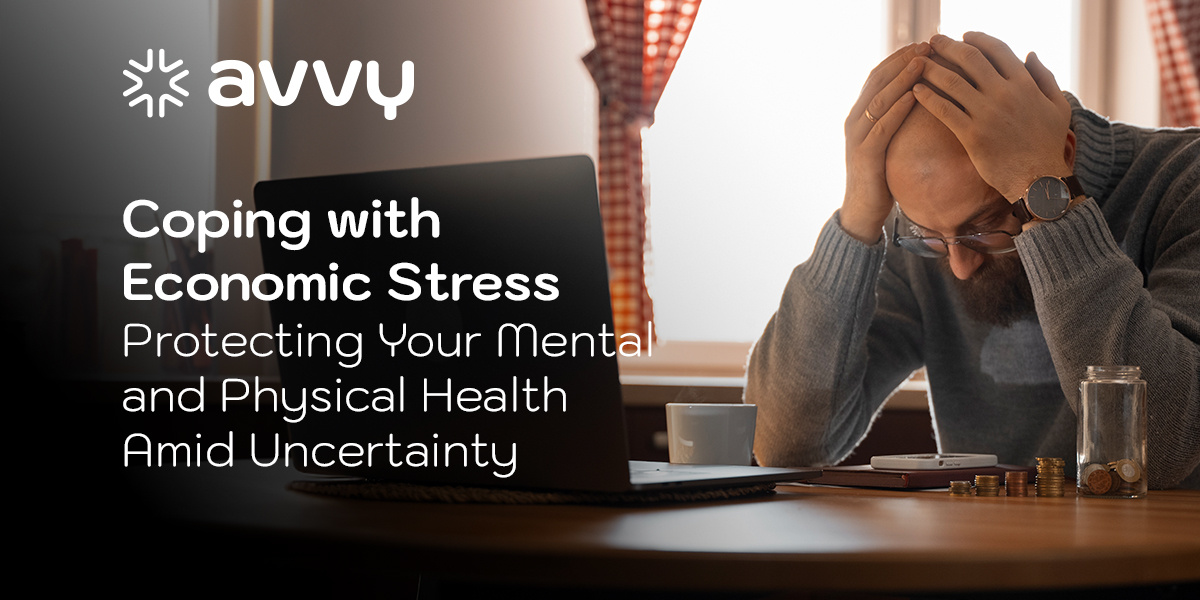The global economy is facing turbulent times, with U.S. tariffs, stock market instability, and rising costs creating widespread financial uncertainty. These economic challenges are not just numbers on a chart—they have real, tangible effects on our mental and physical well-being. At Avvy Health, we believe in empowering individuals to take control of their health during these trying times. Let’s explore how economic stress affects mental health, its connection to physical health, and actionable strategies to navigate these challenges.
The Impact of Economic Stress on Mental Health
Economic downturns, like the current crisis, can lead to significant mental health challenges. Financial insecurity, job loss, and rising living costs create stress that can manifest as anxiety, depression, or even substance abuse.
Key Statistics on Economic Stress and Mental Health
-
A recent survey found that 29% of adults in Canada reported experiencing depression or anxiety due to economic concerns—a sharp increase from 20% in 2016.
-
Studies show that financial difficulties are directly linked to higher rates of common mental disorders such as depression and alcohol use disorders.
-
Chronic stress caused by financial strain can lead to long-term mental health issues, including burnout and severe anxiety disorders.
Why Economic Stress Hits So Hard
Economic uncertainty triggers a fight-or-flight response in the body. Persistent stress elevates cortisol levels, disrupting sleep patterns, impairing cognitive function, and increasing the risk of chronic illnesses like heart disease. For communities reliant on industries affected by tariffs or layoffs, the collective strain can exacerbate social problems such as substance abuse and family conflicts.
The Connection Between Mental and Physical Health
Mental health is deeply intertwined with physical health. When one suffers, the other often follows.
How Mental Health Affects Physical Well-Being
-
Individuals with serious mental illnesses are at a higher risk of developing chronic conditions like diabetes or cardiovascular disease.
-
Conversely, those with chronic physical conditions experience depression and anxiety at twice the rate of the general population.
-
For example, elevated stress levels can weaken the immune system, increase blood pressure, and lead to unhealthy coping mechanisms like overeating or substance use.
This bidirectional relationship highlights the importance of addressing both mental and physical health during periods of economic hardship.
Strategies for Coping with Economic Stress
While we may not control global markets or trade policies, we can take proactive steps to protect our mental and physical health.
1. Prioritize Mental Health Care
-
Seek professional help through therapy or counseling if feelings of anxiety or depression become overwhelming.
-
Practices like mindfulness meditation and cognitive-behavioral therapy (CBT) can help manage stress effectively.
2. Build Financial Resilience
-
Create a budget to track expenses and identify areas for savings.
-
Explore community resources or financial counseling services for support during tough times5.
3. Stay Connected
-
Lean on friends, family, or support groups for emotional relief.
-
Open conversations about financial struggles can reduce feelings of isolation15.
4. Focus on Physical Health
-
Regular exercise helps lower cortisol levels and improves mood.
-
Maintain a balanced diet rich in nutrients that support brain health5.
5. Limit Media Consumption
Constant exposure to negative news can amplify feelings of despair. Set boundaries around your news intake to protect your mental well-being.
Why Taking Action Matters
Ignoring economic stress can lead to long-term consequences for both mental and physical health. Chronic stress not only increases the risk of conditions like heart disease but also diminishes quality of life by impairing decision-making and relationships. By taking small but consistent steps toward self-care and resilience-building, you can regain control over your well-being.
Take Ownership of Your Health with Avvy
At Avvy Health, we’re here to support you through life’s challenges. Subscribe to our newsletter for expert insights on managing stress and improving overall wellness.
Download the Avvy app today to access tools that empower you to take charge of your mental and physical health.




